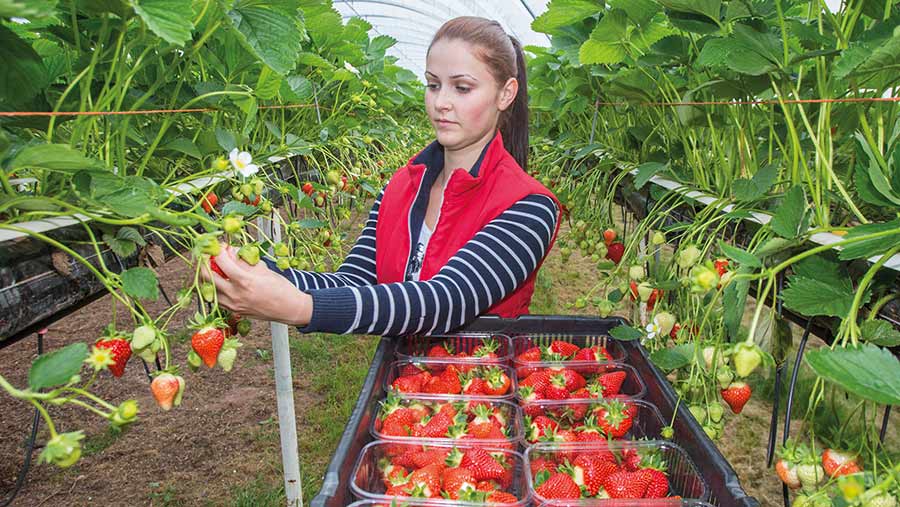Horticulture faces labour, costs and wage inflation crisis
 © AJ and CI Snell
© AJ and CI Snell The horticulture sector is warning of an impending crisis due to wage inflation within the Seasonal Worker Scheme (SWS), labour supply shortages and rapidly rising costs.
The Home Office has announced that from 6 April, visas will only be granted to workers through the SWS who are paid a minimum £10.10/hour.
This represents a 13.5% increase on last year’s national living wage (£8.91/hour) and is being introduced as national insurance contributions rise by 1.25% for employers and employees.
Substantial price rises for fuel, gas, electricity, and fertiliser, driven by the Ukraine war, have also been hitting horticulture businesses hard.
See also: Defra to end AHDB Horticulture levy from April
Some 60% of seasonal agricultural worker visa holders were from Ukraine last year, but men aged 18 to 60 are being told to stay home to fight in the war, forcing the four SWS labour providers to source temporary staff from elsewhere.
Growers are estimating that training new staff could add an extra 10% to the wage bill.
NFU horticulture and potatoes board chairman Martin Emmett told Farmers Weekly the horticulture sector was facing a crisis in the coming months that could last much longer.
“The full dynamics of the situation have yet to unfold,” he stressed.
“The minimum wage of £10.10/hour that the government has chosen to implement under the SWS is an immediate challenge which concerns a lot of growers, although many workers will earn well above this for piecework.”
‘Control prices’
Mr Emmett said the government must ensure the horticulture sector has access to the right materials and do everything it can to control energy, fuel and fertiliser prices, especially for glasshouses and the salad sector.
His own ornamentals business in West Sussex was experiencing an immediate labour shortage and many others faced similar challenges recruiting staff.
Mr Emmett said it was critical that the whole supply chain worked together to understand the impact of rising costs for growers.
Ali Capper, chairwoman of trade association British Apples and Pears, said electricity and gas bills for her fruit and hops business in the Worcestershire/Herefordshire border would rise by 100-600% this year.
She urged the retailers to show their support for British growers by absorbing these cost increases to help mitigate their rising costs.
“Suddenly, an expected 6.5% rise in the national living wage has become 15% when you consider the SWS wage inflation plus rising NI contributions, and then there will be a 10% wage inflation cost to train new staff,” she said.
Ukrainians ‘staying home’
Defra secretary George Eustice acknowledged that most Ukrainian workers who normally travel to work on UK farms would be staying at home to fight for their country.
However, he said the four SWS labour operators have been “relatively successful” recruiting workers from other countries, including Morocco and Bulgaria.
Asked at this week’s Food and Drink Federation annual conference if the government has official figures on worker numbers, Mr Eustice said:
“At this stage, they [the operators] are in that recruitment stage and we won’t know until end of April, early May, when we will see the visa applications coming through.”
Case study: Anthony Snell, Windmill Hill Fruits, south Herefordshire
Soft fruit growers Anthony and Christine Snell employ about 300 seasonal workers, who come to the farm from late May onwards to pick and pack a range of fruits supplied to various supermarkets.
Their annual labour bill at Windmill Hill Fruits is about £4m, which accounts for roughly 70% of business costs.
This year, they also face a £100,000 increase in their electricity bill and a similar hike for fuel and fertiliser.
“We were ready to accept the 6.5% rise in the national living wage to £9.50/hour,” said Mr Snell.
“But we just don’t understand the logic behind the government increasing the minimum wage under the Seasonal Workers Scheme to £10.10/hour.
“We’re very focused on making sure our workers earn plenty of money. Indeed, our best pickers will be earning about £13-£14/hour on piece work.”
Mr Snell said his biggest concern, however, was that he could not see soft fruit growers such as themselves making any profit because supermarkets were trying to hold their prices. “We need a 25-30% rise in farmgate prices,” he added.
